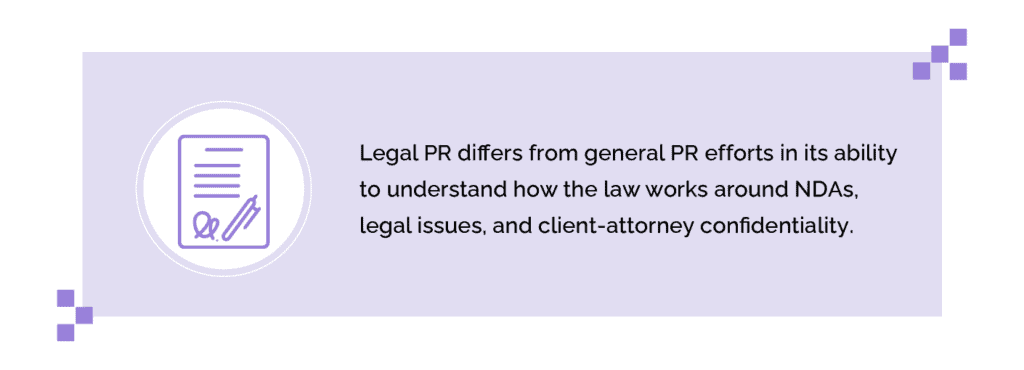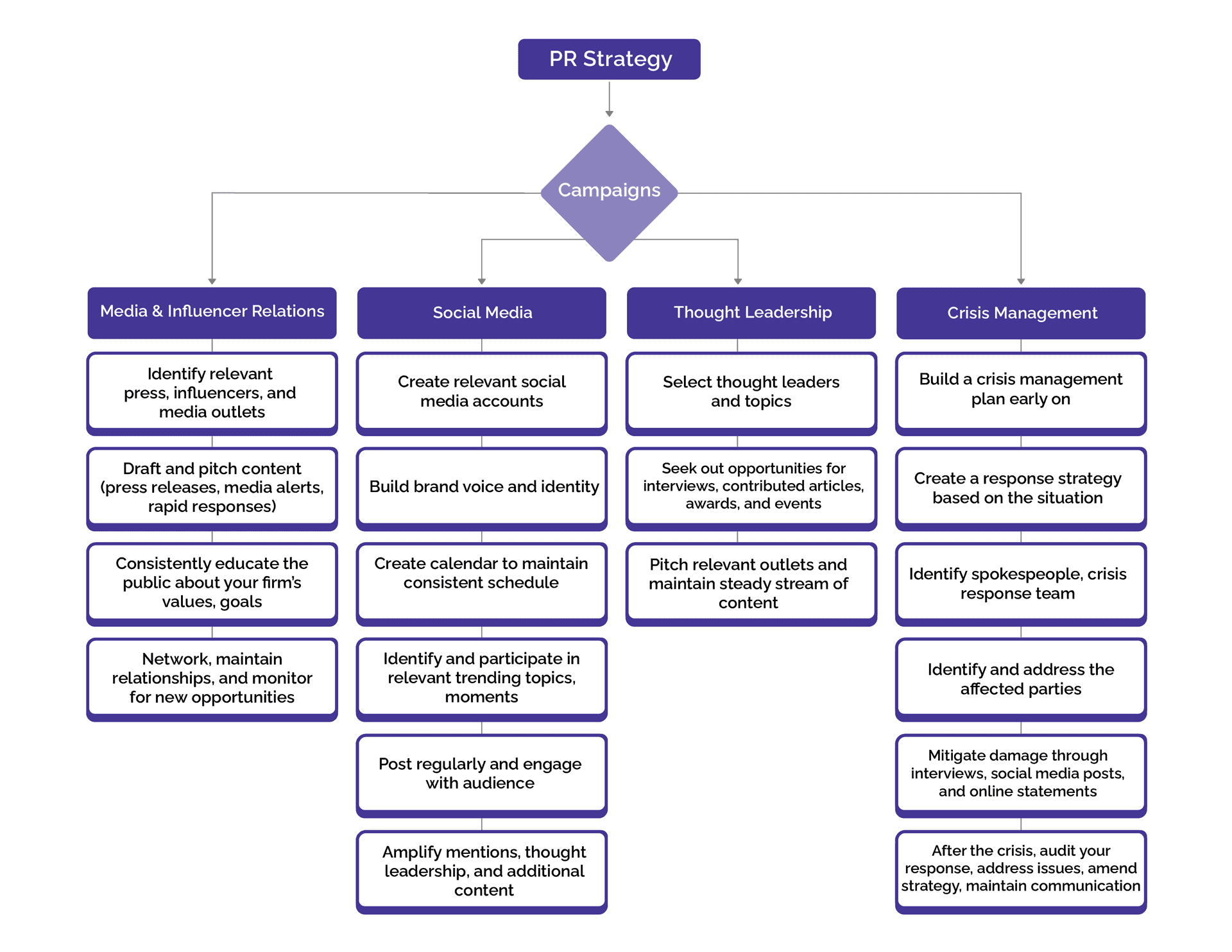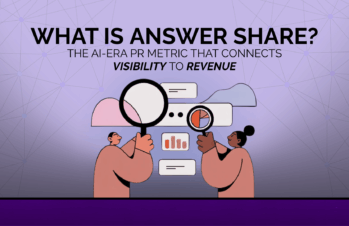Marketing and public relations play a huge role in establishing, maintaining, and elevating a brand’s reputation and boosting visibility. This is essential in the legal field, where clients have a variety of options to choose from when selecting a firm. While it might be tempting to ask someone at your firm to try their hand at PR in their “spare time,” PR is a specialized field that is best managed by a trained professional with the right skills and connections to get your brand positive press.
Beyond helping your law firm gain visibility, credibility, and brand awareness, a strong PR team can also develop and implement crisis communication strategies in cases where firms are handling controversial cases or are representing controversial clients.
A steady cadence of strong press hits, along with a PR amplification strategy, will help prospects find you, trust your expertise, and ultimately choose to work with you.
This guide will explore the many benefits legal firms will experience when working with a strong PR team.
The Fundamentals of Law Firm Public Relations
While the fundamentals of PR can be used across any industry, finding a PR agency with experience in representing law firms will help reduce the learning curve when it comes to understanding the legal industry, your target audience, and more.
Before you start looking for an agency, it’s important to make sure that you know what you are looking for. Let’s go over the fundamentals of public relations for law firms.
- Defining Law Firm Public Relations
- The Role of PR in Shaping Public Perception
- The Key Components of an Effective PR Strategy

1. Defining Law Firm Public Relations
Law firm public relations refers to the PR practices and strategies used to manage a law firm’s brand, messaging, and goals to the media and the public. This is done in an effort to build and maintain the firm’s credibility within the legal industry and to its targeted audience.
Legal PR differs from general PR efforts in its ability to understand how the law works around NDAs, legal issues, and client-attorney confidentiality. As a result, PR teams can tactfully manage any privacy concerns while securing the right coverage for your firm.
In the legal field, this often includes crisis communications work to help position a firm’s work on a controversial case, sharing information, and reducing stigmas in the process. It also involves raising the profile of a single attorney at the firm through thought leadership. As a thought leader, this person becomes a spokesperson for your practice, providing industry insights and thoughtful advice based on experience.
By consulting your team on how to talk about or position the clients of your firm, Legal PR teams can become valuable business partners who enhance your reputation and those of your client list.
Outside of dedicated legal work, public relations work can cover a number of tasks that require specific skill sets—from content creation and social media amplification strategies to building relationships with journalists and influencers and monitoring trends. With experts in tow, your legal firm’s public relations strategy is in good hands to deliver on your business goals and values.

2. The Role of PR in Shaping Public Perception
Simplifying legal outcomes to wins and losses removes a lot of the nuances associated with legal practices and the outcomes they deliver, leading to polarized opinions that are only heightened in today’s media landscape. The right PR agency can navigate uncomfortable situations and deliver clear messaging to keep the public informed.
Attorneys must have a deep understanding of the law and know all of the jargon that goes with it—but their prospective clients and the public may struggle to understand the specifics of a firm’s services or a case they are handling without someone there to break down the complexities of the law. This is where a skilled B2B PR agency can help. PR teams can help translate those technical terms into simplified, digestible messages that help to eliminate misunderstandings. This is critical when it comes to managing crises or helping prospective clients understand the specifics of what you do.
A solid PR team will work as the bridge between your firm’s accomplishments and the public, guiding your audience to a place where they can understand the work you do, while building trust and loyalty in the process.
3. The Key Components of an Effective PR Strategy
While each firm will require different PR strategies to achieve its goals, most will rely on a mixture of practices, including media relations, thought leadership, social media amplification, networking, crisis management, and award submissions. Each of these strategies plays a vital role in shaping the firm’s public perception and will be explained in more detail below.

Benefits of Hiring a Professional PR Firm
- Leveraging the Expertise of PR Specialists
- Building and Maintaining a Positive Reputation
- Gaining Media Exposure and Coverage
1. Leveraging the Expertise of PR Specialists
As we mentioned above, PR specialists are the best resources to develop, improve, and maintain your brand’s reputation. Are you having trouble reaching your target audience? Do you want to elevate your brand and position your attorneys as thought leaders? Do you want to showcase your accomplishments to validate your credibility?
With a long list of contacts, industry know-how, and experiences, PR professionals will help guide you through the process of establishing your brand voice, creating messaging and opportunities that align with your goals, and getting you in front of the people you want to reach.
2. Building and Maintaining a Positive Reputation
Legal teams may face negative press if they work in a controversial sector of the industry if they publicly lose a case, or if they are tied to a controversial person or entity. While 99% of the work you perform may be successful and non-controversial, the 1% can lead the public to develop misunderstandings or harmful opinions of your firm. This happens when the public is uninformed or the press posts stories with polarized messaging that does not take the nuance of the law into consideration.
To combat this, strategic PR teams will structure campaigns to maintain a positive reputation for their clients, balancing your firm’s subject-matter expertise with their strategies. Educating the public about the services, ideas, and practices your firm is for or against will help to illustrate the nuances and responsibilities legal professionals face.
Campaigns might share good news and case studies with positive connotations or put your leaders in front of journalists and media outlets to discuss other cases or aspects of their practices. Leading with transparency, PR teams will assess each situation and find the best ways to shine a light on the positive aspects of your firm to draw in more clients and maintain your firm’s good reputation.
3. Gaining Media Exposure and Coverage
Media relations is the practice of managing relationships with journalists and media outlets in an effort to secure a steady stream of relevant, positive coverage. PR teams work on media relations by conducting research on relevant topics and trending stories and building media lists to support targeted campaigns.
Once the law firm shares a newsworthy opportunity, PR teams will reach out to their contacts to secure coverage. This might include sharing press releases or media alerts, drafting and pitching contributed articles, arranging interviews, and newsjacking—the process of inserting your client into a trending topic or breaking news story, when relevant.
Strategies for Law Firm Public Relations
- Crafting a Unique Brand Story
- Identifying and Targeting the Right Audience
- Utilizing Digital PR for Online Visibility
- Implementing Thought Leadership Initiatives
- Organizing Events to Showcase Expertise
1. Crafting a Unique Brand Story
What are the key factors differentiating your law firm from the competition? Can you explain this to potential clients and stakeholders in a manner that is concise and easy to understand? If the answer is “no,” a PR agency can help you build your brand story and tell it in clear and engaging terms. If the answer is “I think so” or “kind of,” a PR specialist can review your existing brand story and help you improve it.
PR teams are skilled at taking a brand’s identity and shaping it into a crisp story that you can deliver across a variety of situations, tailoring messaging to highlight the best components of your firm that help you stand out.
Crafting the message is just one part of the process. PR professionals also understand the best ways to relay your messaging to the right audience, ensuring your brand story comes across clearly and authentically every time.
2. Identifying and Targeting the Right Audience
You can have a great legal team full of incredible ideas, but it means nothing if you can’t reach the right audience. PR teams will help you create accurate ideal client profiles and buyer personas to identify and target future clients. By developing these personas, your team will have a greater understanding of how your services can address your target audience’s needs, pain points, and pursuits.
PR teams will begin by assessing your current personas and updating them based on new information, trends, or other industry changes. They will also review your competitors’ audiences to find overlap and figure out the best ways to insert your firm as the preferred option.

3. Leveraging Digital PR for Online Visibility
Since most clients use the internet to find the right legal professionals to hire, succeeding today heavily relies on a brand’s digital presence. The right PR agency can help your team navigate virtual waters by improving your search engine rankings, boosting interest in your social media accounts, and driving traffic to your website.
When we talk about website traffic, search engine optimization (SEO) is normally the topic of discussion. Law firms should ensure that their websites are optimized with the right keyword strategy. But beyond strong SEO keyword mapping and link-building strategies, PR is also key to improving search rankings. When industry publications and news outlets reference your firm, they will likely include backlinks to your website. Backlinks cite your domain as a source and directly lead readers to your website.
When backlinks are consistently used, your website’s search rank increases. Backlinks are one of the top factors that affect Google’s page rankings, and they also help establish your firm as a credible source within the legal sector. This means they are essential for a successful attorney website to enhance its search engine visibility. However, backlinks need to be a part of high-quality pieces of content and relevant publications to improve B2B SEO, which is why strong media relationships are essential for legal PR.
It’s also important to monitor upcoming features and key changes to the digital space. For example, Google is testing a new feature called “Mentioned in” to accompany search results. When someone looks up a company or person, a new tab will appear below the company’s main result listing publications, articles, and other websites mentioning the person or organization. This will help to illustrate credibility (or lack thereof) and provides users with instant access to your entire press history—the good, the bad, and the neutral.
A PR team will help build a strong catalog of positive coverage in reputable outlets, but this requires frequent correspondence with the right media outlets. In addition, the upkeep required to maintain a strong digital and social media presence is another reason to bring in PR firms to leverage their expertise in the field, leaving your team to focus on their work.
4. Implementing Thought Leadership Initiatives
Is there a recent case making headlines that your firm can write about? Have you seen a legal term trending on social media? Work with your PR team to find a hook and the right outlet to share your thoughts.
Either written or spoken, thought leadership provides experts from your firm with opportunities to share their expertise and establish themselves as credible experts in the legal field. PR professionals will find relevant speaking engagements in the form of webinars, panel discussions, and podcast interviews.
For written content, PR teams will help journalists draft dynamic articles or industry reports, and they can assist in writing bylined contributed articles for the experts they represent. At Zen Media, for instance, we have an in-house content team that ghostwrites contributed articles for our thought leaders, taking their expert thoughts, experiences, and opinions and turning them into expertly crafted articles and social posts. This allows the firm’s leaders to provide insights on trending topics and common practices while also allowing them to dive deeper into their areas of expertise.
5. Organizing Events to Showcase Expertise
Networking is vital to every industry—and it is especially vital in the legal industry, where building trust and relationships is key. Whether your firm is focusing on a charity fundraiser or an industry-wide conference, the right PR team can help you publicize your event to showcase your expertise and further communicate your brand’s values to clients, colleagues, and the community.
Armed with the right connections, PR teams can turn a small annual event into a larger celebration for your firm. Publicizing and collaborating on events also gives your PR team a chance to invite a curated list of reporters, industry insiders, and clients to increase your visibility, put you in front of your target audience, and drive interest to your firm.
Crisis Management and Reputation Repair
- Understanding the Importance of Crisis Communication
- Preparing for and Handling PR Crises
- Rebuilding Trust and Reputation After a Crisis
1. Understanding the Importance of Crisis Communication
Managing a large roster of cases and clients keeps your team busy, meaning they may not have the capacity to handle the communications around a lost case, controversial take on your work, or polarizing outcome to a case. If poorly handled, this can lead to negative media coverage and online comments, scandals, or other misunderstandings that threaten your brand’s reputation.
For PR teams, crisis communication means mitigating damage by acting quickly to assess the situation, crafting a response, and communicating with the right audiences to ensure your brand’s messaging is authentic and aligned with your values.Not every PR agency handles crisis communication. Contrary to popular belief, crisis comms isn’t synonymous with earned media and PR, as it is a specific form of communications. For the best possible holistic marketing and communications plan, law firms should aim to work with PR professionals skilled in PR, earned media, and crisis comms.

2. Preparing for and Handling PR Crises
PR teams build crisis communications plans early on in their relationships with brands to organize as much of the process as possible. This includes identifying potential crises and key speakers. Next, they build a response strategy, compiling an information sheet with contact information and clearly defined steps. Some plans also include pre-drafted responses that can be quickly adjusted to fit the situation.
This plan comes into play during an actual crisis when the PR team begins to gather all the facts of the situation. It is critical that your PR team receives all of the facts surrounding it to ensure that they are able to handle it in the best way possible.
Once all planned and templated efforts have been carried out, your PR team will work on crafting additional intentional responses, timing, and additional details to align your team and the messaging. While it can be tempting to move quickly, timing is a very important aspect of crisis comms, and it is better to have a clear and calculated strategy with a set timeline than to try to move quickly and end up making matters worse due to conflicting messaging or lack of alignment. This is also the phase where you must begin to identify and address the affected parties.
Lastly, your PR team will talk through strategies for mitigating damage, which may include written or spoken interviews, social media posts, statements on your website, and audience-specific emails. Your PR agency will also monitor responses and make adjustments as necessary.
3. Rebuilding Trust and Reputation After a Crisis
Recovering from a crisis involves acknowledging what happened and learning from the experience to do better next time. PR firms can help you review the crisis situation, identifying how it was caused and what can be done in the future to prevent it, as well as how the communications strategy around potential future events can be improved upon. This crisis audit may include reviewing a list of questions to assess root causes, damage done, and prevention plans, as well as amending any existing crisis communications strategy based on missteps.
After the dust settles, it’s important to maintain communication with stakeholders, the press, and your clients, answering any questions they may have in the aftermath. Building a brand is a long-term process that requires constant maintenance and support.
Measuring PR Success and ROI
- Key Performance Indicators (KPIs) for PR Campaigns
- Analyzing the Impact of PR Efforts on Business Growth
- Demonstrating the Value of PR to Stakeholders
1. Key Performance Indicators (KPIs) for PR Campaigns
KPIs are just another way of analyzing data through specific metrics, including website traffic, lead generation, and customer acquisition. The goal of these metrics is to quantify PR efforts and track success. Key PR KPIs often include monitoring share of voice (SOV) and brand reach.
SOV analyzes your brand’s media presence against a selection of competitors to show how much of that market your brand owns. An in-depth SOV audit can help identify the platforms where your brand is or isn’t performing well, the performance of a dedicated PR campaign, and whether or not your overall brand sentiment or reputation has improved.
This is closely related to brand reach, which reveals the total number of people who accessed your content. Some methods for calculating your brand reach include looking at website visitor metrics month over month, including unique visitors, tracking the metrics on PR amplification social media posts, and tracking engagement on press hits.
2. Analyzing the Impact of PR Efforts on Business Growth
Because PR involves third parties, it can be difficult to accurately measure a campaign’s reach and its subsequent effects on your firm. Understanding KPIs will help you to identify the impact of PR efforts on business growth, but it’s important to note that not all digital activity around PR efforts is easily tracked. Because of dark social—the public’s preference for consuming social media privately rather than engaging publicly—brands may see a boost in website visitors of higher conversation rates that cannot be directly tracked to PR efforts during or after a PR campaign.
Beyond the success that isn’t trackable due to dark social, PR success also means organic press hits (ones that aren’t specifically secured by your team). At Zen, we say: “Press begets press.” This means that the more your secure press, the more other journalists and publications will see you as newsworthy and begin publishing unprompted stories about you.
Consider a situation where your managing partner wants to share information about a trending legal term or practice. Your PR team will build a list of relevant journalists and outlets to pitch. This may lead to several small pieces of coverage, one or two features in larger publications, or a mixture of the two. Regardless of the number of interviews secured or the KPIs, your PR team is steadily increasing your brand awareness, which may result in increased search results, SEO benefits, brand recognition, and a shortened sales cycle.
3. Demonstrating the Value of PR to Stakeholders
PR is essential to help your firm foster trust, positive sentiment, credibility, and a clearly defined voice. Stakeholders will understand this value, but communicating the impacts of both quantitative and qualitative PR efforts is essential to filling in missing gaps.
Your PR teams can achieve this through monthly, quarterly, or yearly reporting, sharing the list of earned media opportunities they secured, the amount of online engagement they received, and connecting areas where PR might have led to a direct conversion. This is also an area where PR firms can share just how much positive sentiment has impacted your brand’s reputation.
Integrating PR with Other Marketing Strategies
- Synergizing Public Relations and Content Marketing
- The Interplay of PR and Social Media Marketing
- Collaborating with Influencers and Ambassadors
1. Synergizing Public Relations and Content Marketing
At its roots, PR is all about content marketing—creating, managing, and distributing content related to your brand and its legal services. As mentioned above, PR teams understand the impact of high-quality content and sharing it with the right audience. Combining your expertise with your PR team’s talents will elevate your webinars, press releases, blog posts, videos, white papers, downloadable documents, and articles, bringing them to their full potential.
2. The Interplay of PR and Social Media Marketing
Another form of content marketing, social media is an ever-changing field of trends and platforms that can elevate your brand identity and increase awareness. The right PR team will know how to amplify positive press coverage on social media, and use social media to help build thought leadership and brand awareness.
The American Bar Association reports that 35% of professional lawyers who use social media have increased their client base. In addition, 85% of professional lawyers say they use social media as an overall marketing strategy. Having a comprehensive PR strategy that leverages social media for amplification and thought leadership development can also have the added benefit of creating a forum for your law firm to engage with past or existing clients, helping build loyalty, and instilling frequency bias in your prospects.
3. Collaborating with Influencers and Ambassadors
If you’ve paid attention to any high-profile cases lately, you’ve likely seen that legal influencers have made an impact across social media. Video explanations of legal terms, trials, and the teams behind them have grown in popularity, while podcast hosts have invited industry experts to discuss a variety of topics.
Rather than ignoring this digital niche, look for influencers who can help you communicate relevant information about your brand and areas of focus to a broader audience. Work with influencers to ensure your brand’s messaging comes across accurately.
Ethical Considerations in Law Firm PR
- Ensuring Compliance with Legal and Ethical Standards
- Handling Sensitive Legal Cases in PR Campaigns
1. Ensuring Compliance with Legal and Ethical Standards
PR teams cover a variety of industries, from finance and politics to technology and fashion. While the content may vary, each organization will present its PR teams with a list of legal and ethical standards that pertain to their work. In addition, PR teams will keep an eye out for updates and changes to these laws during their daily coverage monitoring.
Although they are not experts, clearly outlining these standards, providing detailed explanations, and constantly communicating with your PR team will further ensure they fully comply with legal and ethical standards.
2. Handling Sensitive Legal Cases in PR Campaigns
Attorney-client privilege is critical to maintaining your clients’ trust and operating within the legal and ethical standards of your practice. Figure out ways to communicate sensitive issues with your PR teams and work together to deliver a successful campaign. This may be as simple as providing a list of words or phrases for your PR team to avoid or may involve more complex matters that require additional oversight and input from your legal team. Either way, communication is key to ensuring the message is successfully and tactfully delivered.

How to Choose the Right PR Agency for Your Law Firm
- Factors to Consider When Selecting a PR Partner
- Evaluating the Reputation and Track Record of PR Agencies
1. Factors to Consider When Selecting a PR Partner
It may be easy to look up a PR agency specializing in PR for the legal industry and choose whichever agency pops up on Google first. But, doing so may set you up with a firm that doesn’t handle the full array of PR and strategic communications services that your law firm needs to succeed.
As noted before, not every PR agency handles public relations, earned media across the spectrum, and crisis communications. And more than that, many agencies will handle securing press hits but will not work with clients to draft contributed pieces, provide media training in advance of interviews, and provide monthly or quarterly metrics reporting.
Part of determining the right PR agency for your law firm is identifying your goals. Are you looking for crisis management experts? Do you want to increase your brand’s visibility in a specific field? Would you like to build your firm’s credibility through awards? Are you looking for more speaking opportunities for your senior attorneys?
Identify the goals you know you have, and ask prospective agencies to identify other goals that may help you move the needle forward for your firm. Once you’ve locked in on your goals, ask prospective firms how they would achieve them, and how hands-on your firm and/or attorneys will need to be as part of the partnership. Consider the amount of time, money, and resources your firm will need to implement different PR strategies.
Lastly, as with any partnership, make sure you get along well with your PR team. This will help you communicate more effectively and ensure long-term alignment.
2. Evaluating the Reputation and Track Record of PR Agencies
A good PR agency will have a good track record because, well, it’s their job. But what exactly does that mean?
Some PR agencies tout the amount of coverage placements they secure as the key reason to work with them. For others, it’s less about quantity and more about quality. And then you have firms that specialize in certain industries or areas of public relations.
Ask friends, colleagues, and clients for referrals. Search for reviews around the internet. Analyze the feedback they receive on social media. Look up testimonials and case studies on each agency’s website. Determine what matters most to you.
Once you’ve created your shortlist of potential agencies, get on the phone. The best way to understand what a PR agency can do for your firm is to speak with its team and ask for information to support its claims.
Building a Long-Term PR Strategy
- Developing a Sustainable PR Approach
- Adapting to Changing PR Trends and Technologies
1. Developing a Sustainable PR Approach
Part of fostering a sustainable approach to PR requires a balance between content creation and managing expectations. This means understanding that not every personnel change or courtroom win is newsworthy. Instead of expecting your PR team to churn out a certain number of press releases and media placements every month, discuss ways you can implement a consistent cadence of valuable press hits.
This will help your team build and foster relationships with journalists while also enabling them to diversify their channels and content. The more people and places positively covering your law firm, the better your reach. This also requires creating healthy, evergreen content to supplement slower periods and ensure your brand remains relevant. If your team doesn’t have the capacity to develop evergreen content, make sure your PR agency lists content creation as part of their services!
2. Adapting to Changing PR Trends and Technologies
Like the news it breaks, PR moves quickly. PR firms will spend time every day pouring over the latest trending topics to find the best ways to insert your firm into the conversation. This includes an understanding of the media landscape, where PR professionals keep track of the best dates and times to pitch, the ideal length of an email, and the most effective way to get a response from journalists.
Different technologies like artificial intelligence (AI) and machine learning have been part of the PR toolbox for a few years now, but not all agencies are created equal when it comes to how they leverage new technology. Many PR professionals use platforms to help build media lists, draft and send pitches, monitor for coverage, analyze trends and data, create reports, and to develop content.
At Zen Media, we are 100% in favor of leveraging technology to elevate and improve outcomes, but we also recognize that when used incorrectly, AI can lead to less valuable content, inaccuracies, and other challenges. That’s why we are a human-expertise-first agency that leverages AI only in the context of how it can support our human experts.
We are so committed to elevating our human experts with AI (and not the other way around) that we created our own AI tool to help evaluate the newsworthiness of press releases. Find out whether your law firm’s latest press release was newsworthy for free with Snooze or News.
The Power of Professional Law Firm Public Relations
As demonstrated above, public relations plays a critical role in executing a law firm’s communications strategy, building and maintaining its brand image, and attracting new clients. Interested in seeing how our PR team can help you achieve these goals and more? Reach out.
Ready to take your law firm to the next level?
Schedule a 30-minute discovery call.




